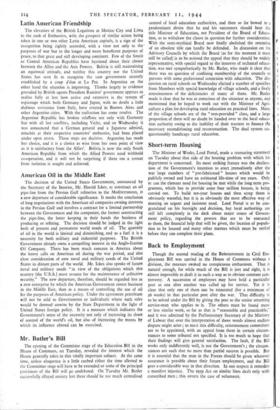Mr. Butler's Bill
The opening of the Committee stage of the Education Bill in the House of Commons, on Tuesday, revealed the interest which the House generally takes in this vitally important subject. At the same time, unless eloquence is a little curbed either the time allotted to the Committee stage will have to be extended or smite of the principal provisions of the Bill will go undebated. On Tuesday Mr. Butler successfully allayed anxiety lest there should be too much centralised control of local education authorities, and then so far bowed to a predominant desire that he and his successors should bear the title Minister of Education, not President of the Board of Educa- tion, as to withdraw the clause in question for further consideration. With the semi-mythical Board now finally abolished the retention of an obsolete title can hardly be defended. In discussion on the Advisory Councils by which the Board (as for the moment it must still be called) is to be assisted the appeal that they should be widely representative, with special regard to the interests of technical educa- tion, was met sympathetically by Mr. Butler, who made it dear that there was no question of confining membership of the councils to persons with some professional connexion with education. The dis- cussion on rural schools on Wednesday elicited a number of speeches from Members with special knowledge of village schools, and a lively consciousness of the deficiencies of many of them. Mr. Butler made it clear that he was as conscious of the situation as anyone, and mentioned that he hoped to work out with the Minister of Agri- culture a plan for developing rural education on practical lines. Many of the village schools are of the " non-provided " class, and a large proportion of them will no doubt be handed over to the local educa- tion authority owing to the inability of their trustees to finance the necessary reconditioning and reconstruction. The dual system un- questionably handicaps rural education.


























 Previous page
Previous page